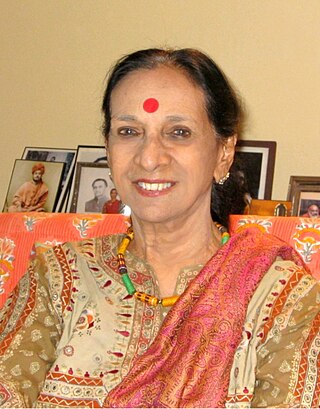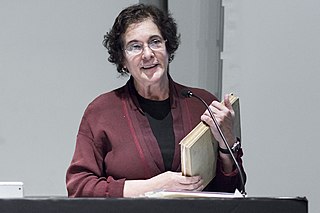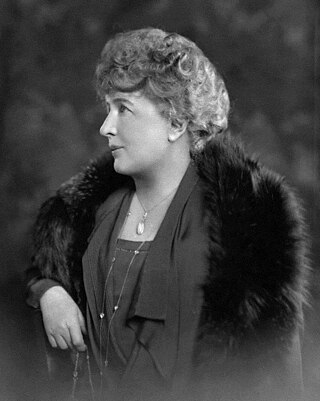
Evelyn Fox Keller was an American physicist, author, and feminist. She was Professor Emerita of History and Philosophy of Science at the Massachusetts Institute of Technology. Keller's early work concentrated at the intersection of physics and biology. Her subsequent research focused on the history and philosophy of modern biology and on gender and science.

Mrinalini Vikram Sarabhai was an Indian classical dancer, choreographer and instructor. She was the founder and director of the Darpana Academy of Performing Arts, an institute for imparting training in dance, drama, music and puppetry, in the city of Ahmedabad. She received Padma Bhushan in 1992 and Padma Shri in 1965. She also received many other citations in recognition of her contribution to art.
Holly Hughes is an American lesbian performance artist.

Lila Abu-Lughod is an American anthropologist. She is the Joseph L. Buttenweiser Professor of Social Science in the Department of Anthropology at Columbia University in New York City. She specializes in ethnographic research in the Arab world, and her seven books cover topics including sentiment and poetry, nationalism and media, gender politics and the politics of memory.

Katherine Mayo was an American historian and nativist. Mayo entered the public sphere as a political writer advocating American nativism, opposition to non-white and Catholic immigration to the United States, along with promoting racist stereotypes of African Americans. She became known for denouncing the Philippine Declaration of Independence on racialist and religious grounds. She published and promoted her best-known work, Mother India (1927), a deeply critical book on Indian society, religion, and culture. Written in opposition to the Indian independence movement, the book received a sharply divided reception upon its publication and was accused by several authors of being Indophobic, including Mahatma Gandhi.

Laurie L. Patton is an American academic, author, and poet who is President of the American Academy of Arts & Sciences. She served as President of Middlebury College from 2015 to 2024.

Kristen Rogheh Ghodsee is an American ethnographer and Professor of Russian and East European Studies at the University of Pennsylvania. She is primarily known for her ethnographic work on post-Communist Bulgaria as well as being a contributor to the field of postsocialist gender studies. She was critical of the role of Western feminist nongovernmental organizations doing work among East European women in the 1990s. She has also examined the shifting gender relations of Muslim minorities after Communist rule, the intersections of Islamic beliefs and practices with the ideological remains of Marxism–Leninism, communist nostalgia, the legacies of Marxist feminism, and the intellectual history of utopianism.
Barbara Weinstein is a professor of Latin American and Caribbean history at New York University. Her research interests include race, gender, labor, and political economy, especially in relation to the making of modern Brazil.
Susan Gal is the Mae & Sidney G. Metzl Distinguished Service Professor of Anthropology, of Linguistics, and of Social Sciences at the University of Chicago. She is the author or co-author of several books and numerous articles on linguistic anthropology, gender and politics, and the social history of Eastern Europe.
Mother India (1927) is a polemical book by American journalist Katherine Mayo on the status of women and girls in Indian society as well as her perception of Hindu culture. The book was translated into more than a dozen languages and reprinted many times in the US.
Gloria Goodwin Raheja is American anthropologist who specializes in ethnographic history. She is the author of several historical works where she explores the concepts of caste and gender in India, colonialism, politics of representation, blues music, capitalism in the Appalachia and other diverse topics. Raheja argues that caste stratification in India was influenced by British colonialism. Monographs on ethnographic history and India have been considered "acclaimed" by the Journal of the Royal Anthropological Institute.
Manisha Sinha is an Indian-born American historian, and the Draper Chair in American History at the University of Connecticut. She is the author of The Slave's Cause: A History of Abolition (2016), which won the Frederick Douglass Book Prize. and, most recently The Rise and Fall of the Second American Republic: Reconstruction, 1860-1920 (2024).

Elizabeth Ann Clark was a professor of the John Carlisle Kilgo professorship of religion at Duke University. She was notable for her work in the field of Patristics, and the teaching of ancient Christianity in US higher education. Clark expanded the study of early Christianity and was a strong advocate for women, pioneering the application of modern theories such as feminist theory, social network theory, and literary criticism to ancient sources.
Hilla Rustomji Faridoonji (1872–1956) was an Indian educationist and political activist.
Joanne Barker became a faculty member within the American Indian Studies Department at San Francisco State University, in 2003. Much of her work focuses on indigenous feminism and the sovereignty and self determination of indigenous peoples. Her work takes a transnational approach, making connections between and across the borders of countries. Barker makes historical and scholarly connections between the oppression and resistance of marginalized communities. An example of this transnational approach can be seen by the work that Barker has done to show connections in the struggles of Palestinians in Israel and indigenous communities in the United States.

Alice Maude Sorabji Pennell OBE was an Indian physician and writer. She was the daughter and wife of Christian missionaries, and the first woman in India to earn a bachelor of science degree.
Sarala Roy (1861-1946) was an Indian educator, feminist, and social activist. She was one of the first women to matriculate from Calcutta University, and was the first woman to be a member of the University Senate. She founded a school for girls and several women's educational charities, and was a founding member and later, the President of the All India Women's Conference. As President of the All India Women's Conference in 1932, she played a key role in organizing efforts towards women's suffrage, and against child marriage. She was also a strong supporter of educational rights for women and girls.
Masuma Begum was an Indian politician, social worker, and feminist. She was a member of the Indian National Congress party, serving as their deputy leader, and was active in politics in Andhra Pradesh, becoming a member of the cabinet in 1960. She was the President of the All India Women's Conference in 1962, and worked towards building networks with international feminist organizations, advocating family planning, and working with social welfare organizations in Hyderabad. She was an early public advocate for the end of the social seclusion of Indian women, a practice known as purdah. She was a recipient of the Padma Shri, one of India's highest civilian honors, in 1974.
Maria Heim is the George Lyman Crosby 1896 & Stanley Warfield Crosby Professor in Religion at Amherst College. She studies ancient Indian intellectual history and literature, with a specialization in the textual traditions of Theravada Buddhism.
Leela Prasad is an Indian historian based in the United States. A scholar of Indian history and the anthropology of ethics, she is a 2023 Guggenheim Fellow and is St. Purandar Das Distinguished Professor of Religious Studies at Brown University.







